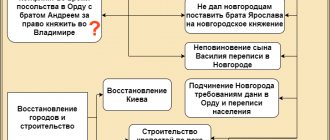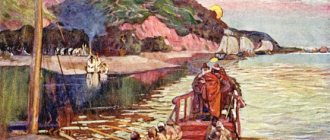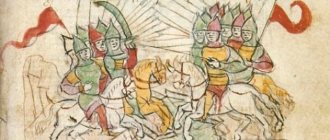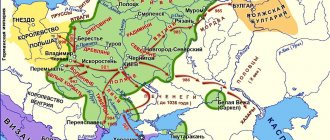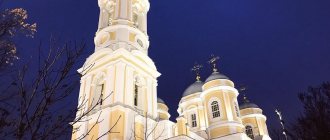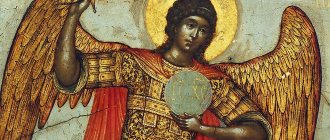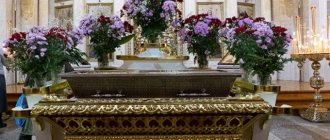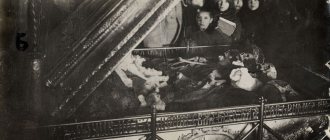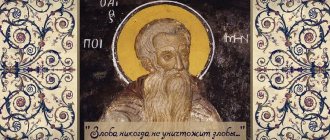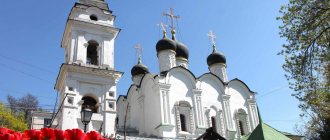On December 5, 2022, the Church honors the anniversary day of memory of the holy noble prince Mikhail Yaroslavich Tverskoy - the 700th anniversary of his repose .
Blessed Prince Mikhail Tverskoy. Icon of the 17th century.
The first and most important functions of the ancient Russian prince were not military campaigns, but administrative, fiscal and law enforcement functions. In fact, the princely court was the prototype of the modern regional administration, coupled with the Department of Internal Affairs. One might say that appanage princes were the prototypes of modern heads of regional governments, governors and mayors. But, unlike the latter, among them there were people who, not only in words, but also in deeds, were patriots of their land, sacrificing their lives for the sake of their subjects.
Spiritual exploits of the young prince
In the first half of the 13th century, the Tatars attacked the Russian land, burned many cities and villages, and mercilessly beat thousands of people. Many were taken captive into terrible slavery, and the people were subjected to heavy tribute. In addition to this disaster, internecine strife between the princes continued: they either disputed each other’s right to the grand princely throne, when they went to the Horde to bow to the khans, or slandered one another. Prince Mikhail Yaroslavich Tverskoy lived during this very difficult time . His father, Prince Yaroslav Yaroslavich (baptized Afanasy, 1230-1271, the first independent prince of Tver) - brother of Alexander Nevsky (1221-1263), occupied the grand-ducal throne for seven years, after the death of Alexander.
Mikhail Yaroslavich was born in 1271, after the death of his father. His mother, Princess Ksenia, raised her son in the spirit of the Old Orthodox faith and carefully taught him to read and write.
Mikhail Yaroslavich and his mother Grand Duchess Ksenia stand before Christ. Tver miniature of the 14th century
The young prince loved to read Divine books, avoided children's games and merry gatherings and diligently attended church. Often, secretly from everyone, in the silence of the night, he offered up his fervent prayers to the Lord. He did not like luxurious dishes, he led a temperate and pious life, decorating his soul with the flowers of virtues. Thus Michael acquired the fear of God - the beginning of all wisdom. He treated the poor and needy with special love and gave them generous alms. Those who suffered troubles boldly went to their prince, knowing that he would find help and intercession; whoever suffered misfortunes and sorrows received from him a word of consolation and approval. The prince's holy life was instructive for everyone, and everyone revered him for his piety and concern for people.
In 1294, Prince Mikhail became the husband of Rostov Princess Anna. In 1299 they had a daughter, Theodora, who died in infancy; in 1300 - son Demetrius, in 1301 - Alexander, in 1306 - Konstantin, and in 1309 - Vasily.
short biography
The birth of the prince was preceded by a beautiful legend about the meeting of his father, Prince Yaroslav Yaroslavich, with his mother Ksenia. According to legend, one day the prince was hunting not far from Tver, near the village. Edimonovo. He went into a church on the river bank and saw his warrior Gregory getting married to the beautiful Ksenia. The prince was so captivated by Ksenia’s beauty that he decided to marry her himself. The saddened Gregory became a monk and founded a monastery on the banks of the river. Tvertsy.
The newlyweds did not live happily for long. According to the traditions of that time, Yaroslav Yaroslavich went to the Golden Horde for a label to reign, and on the way back he fell ill and died. He never saw his son, who was born at the end of 1271.
Confrontation of princes
Rus' was going through a difficult time at that time: princes often rose up against each other and often the rightist had to defend his rights with weapons. Before ascending the throne, Mikhail, according to the forced custom of that time for Rus', went to the Horde to bow to the khan.
The Grand Duke's throne was then occupied by the sons of Alexander Nevsky: Andrei (1255-1304) and Dimitri (1250-1294). There were often strife between the two brothers. Prince Andrei brought the Tatars, who took fourteen cities, including Moscow and Vladimir, heavily plundered the country and were about to march on Tver. The people of Tver were greatly saddened by the fact that their prince was not with them. But they kissed the cross that they would fight the enemy from behind the city walls to the last extreme and would never surrender. Many people came running from other principalities to Tver, who were also ready to fight the enemy. And at this very time, Mikhail Yaroslavich was returning from the Horde. With the greatest joy, the inhabitants of the Tver principality heard the news of the return of their prince; they came out to meet him with a procession of the cross. But the Tatars, having learned about the arrival of Mikhail, did not go to Tver.
The life tells that Prince Mikhail Yaroslavich was tall, strong and courageous. The boyars and people loved him. He diligently read Divine books, diligently donated to churches, and revered the monastic and priestly ranks. He did not tolerate drunkenness and was always distinguished by his abstinence.
Portrait of Prince Mikhail Yaroslavich (1272-1318)
He desired monastic or martyrdom, and the Lord destined him to die a martyr. When Grand Duke Andrei Alexandrovich died, Prince Mikhail Yaroslavich of Tverskoy now became the eldest in the clan, and it was to him that the boyars of the deceased Grand Duke went into his service. Yuri (George) Daniilovich (1281-1325), began to challenge his rights of eldership
The new Grand Duke Mikhail had to go to the Horde to receive a label for the Grand Duke's Vladimir throne. The Prince of Moscow also went there. When he passed through Vladimir, Metropolitan of Kiev and All Rus' Maxim (XII century - December 6, 1305), foreseeing the beginning of strife, with a prayer forbade the Moscow prince to go to the Horde and seek grand-ducal power. Yuri assured the bishop that he was not going to dispute the right to the grand-ducal throne, but “on his own business.” He went to the Horde and met there with the Tver prince. The Tatars were very selfish. They wanted to receive as many gifts as possible and told Prince Yuri of Moscow: “If you give more gifts than Prince Mikhail of Tverskoy, we will give you a great reign.” Such speeches greatly embarrassed the Moscow prince, and he began to seek grand-ducal power. A great discord began between the princes.
Portrait of Moscow Prince Yuri (George) Daniilovich (1281-1325)
Yuri tried in every possible way to win the khan over to his side; he gave great gifts to the Horde. Mikhail Yaroslavich was also forced to spend a lot of money, “which was collected from the poor people, and there was great hardship in the Russian land. The discord between the princes intensified." However, the grand-ducal power remained with Mikhail Tverskoy. The nephew of Alexander Nevsky made peace with the Moscow prince, but there was still no agreement between them: the struggle between Moscow and Tver continued. Meanwhile, the young Khan Uzbek (c. 1283-1341) took the throne in the Horde. Mikhail Yaroslavich had to go to bow to the new khan in order to receive from him a paiza (khan's charter) for his great reign. And this time the grand-ducal throne remained with him. After that, the noble prince returned to Rus'.
The Prince of Moscow, about whose grievances Mikhail complained to Khan, was summoned to the Horde and stayed there for about three years. Yuri, through the khan's nobles, used all means to win the khan to his side; he managed to become close to the khan's family, even became related to the khan, marrying his sister Konchaka (named Agathia in holy baptism). Khan Uzbek now gave the label to the grand-ducal throne to his son-in-law, Prince Yuri. Together with him, the khan sent his ambassadors to Rus', and at their head was Kavgady, one of his confidants. Mikhail meekly renounced his grand-ducal dignity; he sent to tell Yuri:
Brother, if the khan gave you a great reign, then I yield to you. Princes, just be content with yours and do not interfere with my inheritance.
Grand Duke Mikhail of Tverskoy. Tver's struggle for political leadership
Abstract on the topic: Grand Duke Mikhail of Tverskoy. Tver's struggle for political leadership
Introduction
It’s always interesting to learn something new, especially when it comes to the land on which you were born, where a piece of your heart is located... And for those who were born in the Tver region, knowing the history of their native places is simply necessary, if only because history this one is rich in events and people that you can be proud of. One of these outstanding people will be discussed in this essay. Mikhail Tverskoy. Undoubtedly, this personality deserves our attention...
And I would like to start the essay with a very interesting legend about Yaroslav Yaroslavich, the father of Mikhail Tverskoy. According to this legend, Yaroslav Yaroslavich, carried away by falconry, stopped by the village of Edimonovo, located 30 miles from Tver, on the banks of the river. Volga. The prince saw people crowding around the church. Having learned that this was a wedding, the prince went into the church and saw his warrior Gregory together with the daughter of the local sexton, the beautiful Ksenia. Yaroslav Yaroslavich liked the bride so much that he married her himself. The prince's warrior (youth) was so sad that he decided to leave the world and retired to one of the forests on the banks of the river. Tvertsy. A few years later he returned to Tver and founded a monastery there, where he ended his days. According to legend, this monastery is named after its founder Otrochim. For many reasons, this story cannot be considered true, but one way or another we see the fact of the marriage of Yaroslav Yaroslavich and Ksenia, the future mother of Mikhail Tverskoy.
Birth and early life of the prince
After the death of Yaroslav Yaroslavich, his eldest son Svyatoslav Yaroslavich became the Grand Duke of Tver. In the same year 1271, his second son Yaroslav Yaroslavich Mikhail died, but a third was also born, who after baptism was named Mikhail. Officially, Mikhail Yaroslavich became the Grand Duke of Tver at the age of 11, but initially, of course, his mother V.K. ruled. Ksenia and the boyars. First, the prince needed to repel the Lithuanians (1286). Historian Borzakovsky[1] writes: “... the neighbors unitedly went against the Lithuanians: Tverichs, Zubchans, Rzhevichs, Muscovites, Dmitrovtsy, Volochans... caught up with the Lithuanians, defeated them... even captured their prince Domant.” After these events, in order to secure the western borders of the Tver principality, Zubtsov was fortified.
Soon in 1288, the Grand Duke (hereinafter referred to as V.K.) Mikhail Yaroslavich had to withstand an attack from the V.K. Dmitry, who reigned in Novgorod during the reign of Svyatoslav. Mikhail did not want to submit to Dmitry along with other princes. The latter wanted to punish Mikhail Yaroslavich for his disobedience and for the fact that Tver had previously decided to oppose him. Mikhail Tverskoy was only 17 years old at the time, so Dmitry hoped to quickly deal with him. VC. Dmitry with his allies (Andrei Gorodetsky, Daniil Moskovsky and Dmitry Borisovich Rostovsky) entered the Tver Principality and reached Kashin. Apparently, after Batu’s invasion, the Kashin volost was not devastated. The allies stood near Kashin for 9 days, did not take the city, but “they created everything in vain.” Then they took Ksnyatin, ruined it and went to Tver. Mikhail Yaroslavich came out to meet them, but there was no battle, because peace was concluded - its terms are unknown. But probably the Tver prince was now equated with other princes, such as Dmitry.
Trip to Horda. The growth of the prince's importance
In 1293, Mikhail Yaroslavich was in the Horde. The chronicles say nothing about the reasons for his trip, which became the first visit of the Tver prince to the Horde. One of the reasons could be that Mikhail Yaroslavich wanted to get a label for his reign from the new Khan Tokhta. During the stay of the Tver prince in the Horde, Andrei Gorodetsky came there with some other princes to complain about V.K. Dmitry Alexandrovich, thereby trying to seize his throne. However, Mikhail Yaroslavich did not complain along with the other princes. Khan Tokhta sent an army led by his brother Duden. Borzakovsky writes: “The Tatars destroyed not only Pereyaslavl, but also many other cities. They took and destroyed 14 cities, including Vladimir... Suzdal, Yuryev, Dmitrov, Moscow, Kolomna, Mozhaisk, Volok, Uglich.” From all sides, people ran from Tver, hoping to hide from the Tatars, but many were embarrassed by the absence of the prince. Meanwhile, Mikhail Yaroslavich was returning to Tver past Moscow, where there were many Tatars. Some priest led the prince to a safe path and helped him get to Tver, where Mikhail was greeted with joy. The fact that he most likely received a label for reign follows from the words of the Resurrection Chronicle: “The Tatars heard Prince Mikhail coming and did not go as far as Tver.” That is why Andrei and the Tatars did not dare to attack our city. Other reasons may include the following: Andrei was afraid of Prince Mikhail and the people, who firmly decided to fight back. Be that as it may, Tver survived that huge pogrom. The Tatars turned towards Volok, even headed towards Novgorod. But gifts were sent to meet them, and Andrei was recognized by them as a prince. Dmitry fled to Pskov to his prince Dovmont, but this time he did not take any action against Dmitry and even allowed him to move to Tver in 1294, but after some time he dies. Now a new problem arose for Mikhail Yaroslavich and other princes: Andrei Gorodetsky, who has now become V.K. Vladimir and Novgorod.
In 1294, Dmitry Borisovich of Rostov dies, and his brother Konstantin Borisovich assumes reign in Rostov. In the same year, both Mikhail and Andrei Alexandrovich married Dmitry’s daughters: Mikhail to Anna, Andrei to Vasilisa. In the weddings of these princes, a certain calculation is visible: they could receive a rich dowry, and in addition, Mikhail Yaroslavich, having connected himself with family ties with the Rostov prince, protected himself from attack from him (which already happened in 1288).
Also in 1296, Mikhail Yaroslavich was forced to enter into a fight with V.K. Vladimirsky Andrey Alexandrovich, because he “wanted to offend the other princes with something.” However, the chronicles are silent about the reason for the quarrel. He and the other princes were reconciled in Vladimir by Bishop Simeon, although an ambassador was specially sent from the Horde for this purpose.
In 1295, Mikhail concluded an agreement on mutual assistance with Novgorod. The Tver prince announces that he is in alliance with Daniil of Moscow and Ivan Pereyaslavsky, and therefore “obliges to help Novgorod in case of offense from anyone,” for his part, Novgorod promises support to Mikhail, “if he suffers from Andrei, from Tatar or from someone else.” In 1300, the Swedes built the Landskrona fortification on the Neva at the mouth of the river. Oh you. Now the Swedes could interfere with Novgorod's foreign trade along the Baltic Sea. Novgorod could not allow this. Tver was also interested in Novgorod trade relations, because a lot of goods went to our city. In 1301, the Novgorodians with Andrei and the Vladimir regiment went to Landskrona and burned it. Mikhail Yaroslavich also went to help them, but upon hearing that the Swedes had already been defeated, he turned back.
In the same 1301, a princely congress took place in Dmitrov. Princes Andrei Alexandrovich, Mikhail Tverskoy, Daniil Moskovsky, Ivan Dmitrievich Pereyaslavsky came to see it. The following year, after the death of Ivan Dmitrievich, the question arose again of who would become the owner of Pereyaslavl. The choice of the inhabitants of this city themselves was in favor of Daniel, and after his death in 1303 - in favor of his son Yuri. Starting next year, a stubborn struggle begins between Tver and Moscow.
The Great Reign of Mikhail Yaroslavich
In 1304 Andrei Alexandrovich dies. His boyars immediately leave for Mikhail Yaroslavich. This act of the boyars suggests that the Tver principality was then considered the strongest. The boyars were confident that Tver would remain in. Princely Vladimir throne. Mikhail Yaroslavich went to the Horde for the label “he, by seniority, reached the level of great reign.” But Prince Yuri of Moscow, Mikhail’s nephew, also went to the Horde to seek a great reign, despite the ban from Metropolitan Maxim (the Metropolitan, as a clergyman, wanted to maintain peace between the princes, especially since he gave priority to rule to his uncle rather than to his nephew). But Yuri deceived Maxim, saying that he would go to the Horde, but not for a label. Meanwhile, while Mikhail Yaroslavich was in the Horde, his boyars acted in favor of their prince.
Tver considered itself so strong that it was going to simultaneously cope with Novgorod, Pereyaslavl, and Yuri. The Tverites captured Boris Danilovich, Yuri's brother, in Kostroma; They wanted to capture Yuri himself, but he managed to escape to the Horde in time. After this, the Tver boyars send with the name V.K. Mikhail Yaroslavich governors to Novgorod. The Novgorodians were offended by the unauthorized act of the Tverites (especially after the reign of Andrei, with whom Novgorod had good relations; moreover, it was not yet known who would receive the label for the great reign in the Horde). That is why the Novgorodians not only did not accept the governors, but also sent the army to Torzhok, because They were confident that it would be advantageous for the enemy to capture this city, and Tver, among other things, was also located closest to Torzhok. In fact, two armies met near this city, but both sides reconciled, deciding to wait for the arrival of the princes from the Horde. At the same time, the Tver army, led by boyar Akinf, decided to capture Pereyaslavl. But when the army approached the city, it turned out that they had known about their arrival for a long time. An army came from Moscow under the command of Ivan Danilovich. A battle took place in which the Tver residents were defeated and fled to Tver with heavy losses. Thus, the efforts of the Tver boyars to help Mikhail Yaroslavich were in vain and led to nothing.
Meanwhile, Mikhail himself, being in the Golden Horde, acted more successfully. After all, it was Mikhail who received the label for the great reign. The Tver prince spared no expense to obtain the label. The Tatars told Yuri that if he gave a larger ransom, he himself would receive a label. However, Yuri could not do this, and therefore refused. However, the rivalry between Moscow and Tver did not end there. Now Tver wanted to weaken its rival Moscow. This time, Mikhail Yaroslavich himself went against Prince Yuri and his brothers, but he never took Moscow, and therefore reconciled with the Moscow prince, and he himself returned to Tver.
While Tver's attempt to cope with Moscow turned out to be a failure, the latter did not waste any time. In 1305, Yuri eliminated the slightest threat from the Ryazan principality when he killed the Ryazan prince Konstantin Romanovich, who was in his captivity; the Moscow prince also kept Kolomna under his influence. In the winter of 1308, Mikhail Yaroslavich again went to Moscow, but with a larger army than before. He “did much evil”; A battle took place, but Moscow was never taken. The Tver and Moscow princes concluded a peace, the terms of which are unknown to us.
Until now, Mikhail Yaroslavich had never been to Novgorod, although there he was really revered as a prince (remember the terms of the peace concluded by the Tver boyars and Novgorodians). Only in 1307 did he go there. Between the city and Mikhail Yaroslavich, 4 letters of agreement and one complaint (against the governors) were concluded; although, of course, there were some disagreements between the prince and the Novgorodians.
However, the prince's plans extended much further. Not having time to take over Moscow, Mikhail Yaroslavich decided to take over Nizhny Novgorod. If the prince had succeeded in this, he would have found himself in a very advantageous position. Through the mouth of the Oka, Mikhail Yaroslavich could always have influence on Moscow, and through the mouth of the Tvertsa - on Novgorod. In addition, do not forget that N. Novgorod is a large trading city. However, this campaign ended unsuccessfully for Tver. The historian Borzakovsky highlights the participation of Russian metropolitans in this struggle and explains the motives why they sided with Moscow.
In 1311, Mikhail Yaroslavich sent a strong army under the command of his son Dmitry, who was 12 years old, to occupy Nizhny Novgorod. Mikhail Yaroslavich himself did not go to N. Novgorod, because he was afraid that in his absence, Yuri or the Novgorodians might attack Tver. However, other princes, including Tver's rivals, did not interfere with the march of the Tver army, and it successfully reached Vladimir. At that time Peter was the metropolitan in Vladimir. He stopped the prince and “Peter Metropolitan did not bless him with the table,” and Dmitry, having stood for three weeks, “beating Metropolitan Peter with his brow, may he be given permission,” returned without any success. This fact was almost decisive for the entire subsequent history of Tver. But Metropolitan Peter was too unfriendly towards Tver, and there were reasons for this. After the death of Metropolitan Maxim in 1305, not without the participation of Mikhail Yaroslavich, instead of Peter, a certain abbot Gerontius was sent to Constantinople for ordination as metropolitan. Undoubtedly, Michael wanted to see the head of the spiritual power of a person who would owe him his rank, and Gerontius was suitable for this. The relationship between Tver Bishop Andrei and Peter played a special role in this story. Andrei believed that he himself could occupy the post of Peter, because he was a bishop in the principality where Mikhail Yaroslavich reigned. Therefore, wanting to harm Peter, the Tver bishop slandered him before the patriarch. Surprised by the denunciation, the patriarch “sent his learned cleric to Russia to consider the matter at a council, ordering him to say to Peter: “Try to cleanse and correct this.” Of course, Michael knew about Andrei’s resistance to Peter and about his slander against the saint - he knew, but he did not stop his bishop. At least, if Mikhail did not support Andrei, he did not accept Peter’s side, while Ivan Danilovich supported the metropolitan at the council. Of course, this is where Peter’s love for Ivan Danilovich, and therefore for Moscow, originates. It is clear that the Metropolitan could not give his preference to Tver. That is why Peter did not allow the Tver army to capture N. Novgorod. Solovyov about
In 1313, on the occasion of the accession to the throne of the new Uzbek Khan, V.K. went to the Horde. Mikhail Yaroslavich and Metropolitan Peter. The saint returned back in the same year 1313, and the prince only in 1315. In this year, Bishop Andrei left his post and went to the monastery, and the Metropolitan appointed Varsunofy in his place. It is unknown whether Andrei left the bishopric voluntarily or at the request of Mikhail Yaroslavich: if under duress, this meant that the Tver prince wanted to brighten up the unfavorable impression made by the Tver bishop on the metropolitan, which would allow him to get closer to Peter.
Worsening relations with Novgorod and Moscow
At this time, Mikhail resumes his struggle with Novgorod and Moscow. The Novgorodians did not really like the fact that they were oppressed by the Tver governors. And in 1312, Mikhail Yaroslavich was angry with Novgorod and went against it with an army, but the reason for the campaign remains unknown. The historian Belyaev believes that Prince Mikhail was probably dissatisfied with the change of mayor Mikhail Pavshinich, his supporter. Be that as it may, the prince of Tver brought his governors out from there, occupied all the surrounding cities and blocked the grain supply, which was the most difficult for Novgorod. In such a difficult situation, the Novgorodians sent Vladyka Davyd to Tver. An agreement was signed between them, according to which Novgorod undertook to pay 1,500 hryvnia of silver, for which Mikhail “opened the gates,” i.e. missed grain convoys, in addition, the prince returned his governors to the city. Gradually, Novgorodians' dissatisfaction with Tver grew and grew. According to Borzakovsky, such relations between Tver and Novgorod are another reason for the defeat of Tver. It was simply reasonable and natural that the Novgorodians were looking for an opportunity to enter into an alliance with Prince Yuri and help him in every possible way in the fight against Tver.
After the victory in 1312, the Tver governors began to press the Novgorodians even more. Now the latter were just waiting for an opportunity to take action, and it soon presented itself to them...
In 1313, Tokhta died and Uzbek ascended the khan's throne. Peter, Mikhail Yaroslavich and other princes went to the Horde to confirm their previous labels or to receive new ones. The Uzbek had no reason yet to take away the great reign from Mikhail Yaroslavich, and Mikhail himself worked in the Horde to retain it for himself. The Novgorodians took advantage of Mikhail's absence and, at a meeting in 1314, decided to expel his governors, and instead sent them to Moscow to invite Prince Yuri Danilovich. He agreed to the proposal of the Novgorodians. The justification for the khan would be that the Novgorodians invited him, and it was up to them to decide who would be their prince. However, the Moscow prince first sent Prince Fyodor of Rzhevsky to Novgorod, who put the governors of Mikhail Yaroslavich into custody. Then the Novgorodians and Prince Rzhevsky entered the Tver Principality and began to burn villages there. Since Mikhail was still not in Tver, his 15-year-old son Dmitry Mikhailovich spoke in his place. The Tver and Novgorod armies met on the Volga: they were separated by the river. But they did not fight, but only stood in sight of each other for six weeks, until frost set in. Then peace was concluded - most likely on conditions favorable to Novgorod, because The Novgorodians immediately sent people to Moscow to invite Prince Yuri. Thus, Tver had to make concessions against its will. But although Novgorod insisted on its own and even chose the prince he liked, the short disagreements with Tver had a bad effect on Novgorod. The chronicle says: “That same winter, bread was more expensive in Novgorod.” This was probably because the supply of grain to Novgorod was stopped by the Tver prince. However, all this happened for a short time, because soon Yuri had to leave Novgorod and go to the Horde, where Uzbek summoned him.
It was not in vain that Mikhail Yaroslavich spent 2 years in the Horde. The result of his efforts was obvious: he was abandoned by the Grand Duke of Vladimir, in addition, Mikhail, apparently, complained to him about the Novgorodians and Yuri of Moscow. In 1315, the Khan sent not only his ambassadors to Rus', but also the Tatar army to Novgorod. Yuri was summoned to the Horde not only because of Mikhail Yaroslavich’s complaint, but also because of his dissatisfaction with Uzbek. Perhaps Yuri's actions in relation to Novgorod were described by Mikhail as disrespect for the khan. But Yuri was in no hurry to go to the Horde. He wanted to see how Mikhail’s campaign against Novgorod would end.
Mikhail Yaroslavich gathered large forces. Now he headed to the Novgorod lands. Mikhail met the Novgorodians with the Novotorzhites under the command of Prince Afanasy Danilovich at Torzhok, where they had been standing for 6 weeks, collecting news about the Tver prince. The Novgorodians were defeated, the suburb of Torzhok was burned, and the remnants of the people disappeared into the city. Now Mikhail Yaroslavich could capture his main enemies. He sent people to Torzhok to say: “Give me princes Athanasius and Fyodor Rzhevsky and I will make peace with you.” But the Novgorodians refused to hand over Prince Afanasy and only involuntarily handed over Fyodor Rzhevsky. A peace was signed, according to which the Novgorodians agreed to pay 5,000 hryvnias of silver. After this, Mikhail summoned Prince Afanasy and the Novgorod boyars, captured them and sent them to Tver as hostages while the established payback was paid. From the people who remained in Torzhok, Mikhail Yaroslavich began to take more compensation, as much as anyone could give, he took away horses, weapons, and in the end he even destroyed the Kremlin. After this devastation, Michael sent his governors to Novgorod. The Battle of Novotorzh took place on February 10, 1315. But despite the concluded peace, Mikhail Yaroslavich still squeezed Novgorod trade, detaining merchants and carts with grain.
Taking advantage of his advantage, Mikhail Yaroslavich forced the Novgorodians to conclude a new agreement beneficial to himself. Under this agreement, the prince of Tver and Novgorod agreed:
1. mutually not to look for stolen goods on each other during this storm, during this jam, in the princely volost or throughout the entire Novgorod volost.
2. on the basis of the old Feoktist charter, it was necessary to take the money (kunas) and abandon those villages and people who in this mess were mortgaged for the prince, or for the princess, or for the boyars, even in this case, if the villages were bought.
3. give up without ransom the prisoners taken throughout the Novgorod land.
4. v.k. Mikhail and his boyars should not direct his army to Novgorod, and should not detain guests in Suzdal land or anywhere else.
5. and for all this, the prince receives 12,000 silver from Novgorod, and in this amount include the 3,000 that the prince's attorneys Fyodor Yuryevich and Elferiy Zhid Slalich took from the hostages; pay this money in 3 terms at the grassroots level, i.e. twice as light as Novgorod; upon payment of the first agreed portion, the prince must allow grain and all sorts of guests into Novgorod; The deadline for payment is Palm Sunday; and when the prince receives the silver, he must release all the hostages with a kiss. Novgorod must maintain the reign honestly, without resentment, and the Great Prince must maintain Novgorod without resentment regarding the duty. When Novgorod pays the entire 12,000 ser., the prince must cut up two previous letters - [letters written near the Volga and in Torzhok].
During all these events, Yuri was still in Rus', waiting to see how it would all end. And only on March 15, 1315, he went to the Horde with some Novgorodians, ready to support the complaints of the Moscow prince regarding Mikhail Yaroslavich to the khan. But on the way they were captured and taken to Tver. This became another reason for unrest in Novgorod in 1316. The situation escalated so much that not only was it dangerous for Tver residents to be in the city, but it also became dangerous to show oneself as a friend of Tver. Several people were killed who were accused of collaborating with Mikhail Yaroslavich. In the same 1316, the Tver prince again went on a campaign against Novgorod, which ended with the defeat of the Tver army: the army got lost among lakes and swamps, many people died. The Novgorodians decided to take advantage of the misfortune that had happened to the Tver residents, and therefore sent Bishop Davyd to Tver, who offered to release the Novgorod hostages for a ransom. But Mikhail Yaroslavich decided to keep this trump card in reserve in case of further struggle with Yuri.
A turning point in rivalry with Moscow
It was not for nothing that Moscow Prince Yuri spent 2 years in the Horde. During this time, he managed to gain the favor of Khan Uzbek, and he married his sister Konchaka to Prince Yuri, who took the name Agafya at baptism. Then Uzbek decided to give the great reign to his son-in-law and gave him 50 thousand soldiers under the command of Kavgady, who enjoyed great confidence at the court of the khan, to establish Yuri on the grand princely throne. The other princes did not yet know in whose favor the dispute about the great reign would be resolved, so for now they sided with Mikhail Yaroslavich. Mikhail and the Suzdal princes met with Yuri on the Volga near Kostroma. They stood there for a long time, then the prince of Tver learned about Yuri’s success and his wedding. Mikhail Yaroslavich did not want to disobey the Khan’s will, but he also understood that he could not escape the battle with Yuri - he would now not calm down until he weakened Tver as much as possible.
Yuri wanted to attack Tver from two sides at once: from the south (he) and from the north (Novgorod). Therefore, Mikhail Yaroslavich first opposed the Novgorodians and defeated them. Having dealt with one enemy, the Tver prince moved against another. Yuri had already managed to reach Klin. For some reason, he took his wife on this trip. At Klin, Yuri entered the Tver lands and began to burn, rob and destroy all the villages they passed through. Mikhail, wanting to protect his inheritance from defeat, went out to meet Yuri and sent him to tell him: “Brother, the king gave you a great reign, rule over it, but do not intercede in my region, be content with yours.” But Yuri Danilovich wanted to weaken Tver, so he began to destroy the Tver lands, although he did not enter the city itself, because it was well fortified. After consulting with the bishop, princes and boyars, Mikhail Yaroslavich set out with the Kashin residents against the Tatars and met with them near the village of Borteneva, 40 versts from Tver. In the brutal battle, many Tatars died and fled. Kavgady, Konchaka, Boris and Afanasy Danilovich were taken prisoner. Yuri fled to Novgorod with a small number of people. This battle took place on December 22, 1317. Mikhail Yaroslavich understood how much influence Kavgady had on the khan. Therefore they treated him with great courtesy. Mikhail tried to lure Kavgady to his side, and he deftly showed imaginary love for Mikhail Yaroslavich.
Yuri turned to Novgorod for help, putting him in a difficult position. On the one hand, the Novgorodians did not want the strengthening of Tver, but by taking Yuri’s side, they could pay with the lives of their hostages who were in Tver; and by refusing him, they could pay with their lives in front of the Tatar army, which the khan could send to his son-in-law. Therefore, a neutral position was chosen. Novgorod acted as an intermediary between Yuri and Mikhail. An agreement was signed, according to which Tver made certain concessions: it would release prisoners, would not delay grain convoys, etc. But Yuri’s wife died in captivity, and rumors spread that she had been poisoned. Kavgady was released from captivity and, together with Yuri, went to the Horde and began to complain about Mikhail Yaroslavich, blaming him for the death of Konchaka, but on the other hand, if Kavgady had not accused Mikhail, then he himself would have been guilty. Mikhail was demanded to go to the Horde for trial before Uzbek, but going there meant going to certain death. But Mikhail Yaroslavich was in no hurry to go to the Horde, but sent his 12-year-old son Konstantin there as a pledge of his loyalty. Mikhail Yaroslavich asked the boyars for advice. They told him: “One of your sons is already in the Horde, if you want, send another, but don’t go yourself.”
The tragic death of the Tver prince
In August 1318, Mikhail Yaroslavich left Tver for the Horde, receiving a blessing from his bishop Barsanuphius. In Vladimir, Mikhail met the Khan's ambassador Akhmyl, who warned him that he had been slandered by Kavgady. His children told him: “Do not go, our dear father, to the Horde, but send one of us, because you have been slandered before the king; wait until the king’s anger subsides.” Mikhail Yaroslavich quite rightly answered them: “You see that the Tsar does not demand you... and only wants my head. If I don’t go and evade, my native principality will be captured, many Christians will be beaten, and after that I will still have to die. It is better for me now to lay down my life for many souls!”
Mikhail Yaroslavich was groundlessly accused of not paying tribute to the tsar, fighting against his ambassador and poisoning his sister. The prince was found guilty and a heavy wooden block was placed on him. Kavgady sought by all means the execution of the Grand Duke of Tver. Khan finally expressed his consent to the death of Mikhail Yaroslavich.
Many Tatar executioners burst into Mikhail’s tent. The executioners grabbed the prince by the block around his neck and hit him against the wall of the tent so hard that they broke through it. Then the Tatars threw Mikhail to the ground and kicked him for a long time. Finally, one of them, named Romanets, stuck a knife into the prince’s chest and turned it several times. So on November 22, 1318, the Grand Duke of Tver Mikhail Yaroslavich died. But Vladimir Kolosov believes that this story has a continuation. After the reprisal, Kavgady angrily said to Yuri: “Isn’t he your oldest brother, like a father; Why is his body lying naked? After this, Mikhail Yaroslavich was tightly tied to a large board by order of Prince Yuri. But the next morning he was found lying to the side. Mikhail's right hand was on his face, and his left was pressed to the wound on his chest. Based on this, we can conclude that the prince died not at the hands of the Tatar executioners, but an even more painful death: a deep faint was mistaken for death, after which the prince regained consciousness and, obviously, having lost a lot of blood, climbed off the board, after which he died.
Mikhail's body was brought to Moscow and buried in the Spassky Monastery. But it was not long before they found out about this in Tver. VC. Anna, her sons Dmitry, Alexander, Vasily asked Yuri to let their father's body go home. But they received permission only in June 1319. “And they sang a funeral hymn over him and placed him in the church of the Holy Savior on the right side of the land ... on the 6th day of September.” After the tragic death of her husband, V.K. Anna took her hair at the Tver Sophia Monastery. After the death of Mikhail Yaroslavich, his son Dmitry began to reign.
What was Mikhail Yaroslavich like?
It is known from the chronicles that Ksenia loved her son Mikhail Yaroslavich very much. She raised him “in the fear of the Lord and taught him the holy books and all wisdom.” Description of his appearance: “The gray hair is small. Bald. Brad, aka Mikhail Chernigovsky. There is a hat on the head, a cross in the right hand, and a sheathed sword in the left.”
Literature:
- Borzakovsky V.S. "History of the Tver Principality." St. Petersburg, - 1876.
- Kolosov V.I. "Past and present of Tver".
The first military victory of the Tver prince
But the Grand Duke of Moscow did not want reconciliation with Prince Mikhail of Tver. Gathering a large army, together with Kavgady, he attacked the Tver Principality, burning cities and villages. “Enemies took husbands and wives and subjected them to various tortures, abuses and death. Having devastated the Tver principality on one side of the Volga, they were preparing to attack its other part, the Trans-Volga region. Grieving over the disasters of the Russian land, the pious Prince Mikhail called the Tver bishop and boyars and said to them: “Didn’t I give in to my relative? I endured everything, thinking that this trouble would soon end. Now I see that Prince Yuri is looking for my head. I am not guilty of anything before him; if guilty, tell me of what?” The bishop and boyars, shedding tears, answered the prince in one voice: “You are right, our prince, in everything. You showed such humility in front of your nephew, and for this they want to devastate the entire principality. Go against them, sir, and we are ready to lay down our heads for you.”
Mikhail replied:
Brethren! You know what is said in the Holy Gospel: Greater love has no one to sow, but whoever lays down his life for his friends (John 15:13). Now we have to give our lives for many people captured and beaten by enemies.
Prince Mikhail of Tver gathered his regiments and courageously went out to meet the enemy. The enemies met forty miles from Tver (December 22, 1317 in the village of Bortenev). The army of the Moscow prince could not withstand the onslaught of the Tver army and hastily fled.
I.I. Belov. Battle of Bortenevskaya 1317
“Prince Mikhail pursued the enemies, and countless warriors, beaten and crushed by horses, dotted the battlefield; they lay like sheaves in the field during the harvest.” Grand Duke Yuri fled with the rest of the army (to Torzhok, and from there to Veliky Novgorod). His wife Konchaka, many princes and Tatars were taken prisoner by the victors.
Facial chronicle vault. The scene of the desecration and murder of Prince Mikhail Tverskoy
Death of the Prince
With a heavy heart, Mikhail Tverskoy went to Uzbek Khan. He understood that, most likely, he would not return back. Arriving in the Horde, the prince, appearing before the khan, denied all accusations and requested a trial. The Uzbek did not dare to kill the prince himself and gave him to his assistant Kavgady. On November 22, 1318, after an unjust trial, Mikhail Tverskoy died in his own tent, torn to pieces by a crowd of ill-wishers led by Kavgady.
Mikhail's wife, Anna, begged George to give her husband's body for burial. The residents of Tver met the coffin with Mikhail's body on the banks of the Volga. The body of the Tver prince was buried in front of a large crowd of people in the Transfiguration Monastery.
Having accepted martyrdom, the prince defended his lands from the wrath of the Tatars and George. For his piety and defense of Orthodoxy, he was canonized. According to the Orthodox canon, Saint Michael of Tver became the patron saint of the Tver land. His icons are in the churches of Russian cities and villages, and he himself is considered the defender of the Russian land and the patron of the Orthodox. Monuments to Mikhail Tverskoy are located on his native land.
Currently, the most significant of them stands on Sovetskaya Square in the city of Tver.
The machinations of Yuri Moskovsky against Mikhail Yaroslavich
Seeing Yuri's defeat, Kavgady the day after the battle came to Tver and asked for peace. Mikhail received him with honor, believing his flattering speeches, generously presented Kavgady and his people and released him with honor. Meanwhile, the Grand Duke of Moscow gathered a new army and with it again moved towards Tver. Michael did not want to shed Christian blood in vain again and insisted on making peace with the princes.
At this time, the wife of the Grand Duke, Konchak, unexpectedly died in Tver. A rumor appeared that the Grand Duchess was poisoned in Tver. The Moscow prince and Kavgady hurried to the Horde. They wrote many false testimonies against Prince Mikhail of Tver, as if he, having collected a lot of tribute from the cities, wanted to flee to the Germans, but did not want to go to the khan, that in general he did not obey the khan’s authority. Kavgady did not want the Tver prince to come to the Horde and be able to justify himself. Therefore, he began to persuade the khan that he should quickly send an army to Prince Mikhail. But in August 1318, the noble prince Mikhail went to the khan, speaking to his spiritual father. “Father,” said the holy prince, “I cared a lot about helping Christians, but for my sins they have to endure many hardships because of our strife. Now bless me, father: perhaps I will have to shed my blood for the Orthodox people.”
The prince said goodbye to his loved ones on the banks of the Nerl River. Mikhail Yaroslavich was accompanied by his wife, Princess Anna, and his son, Prince Vasily. Here the prince said goodbye to them forever. In Vladimir they were met by the Khan's ambassador Akhmyl. “Hurry to the Horde,” he said to Mikhail, “the khan is waiting for you; If you don’t show up in a month, the king has decided to go to war against your principality. Kavgady slandered you to the khan that you would not come to him.” Then the boyars began to dissuade the prince from going to the khan: “Here is your son in the Horde, send another.” His sons also told him: “Beloved parent, don’t go to the Horde yourself, it’s better to send one of us; after all, they slandered you before the khan. Wait until his anger passes.”
But the Tver prince answered firmly:
Know, my dear children, it is not you that the khan demands, but me; he wants my head. If I avoid going to the khan, then my homeland will be devastated and many Christians will be killed, and then I myself will not escape death; Isn’t it better now to lay down my life for many?
Library of the Russian Faith Life and murder of Prince Mikhail Tverskoy. Great Menaion of Cheti →
Read online in original
Iconography
On icons, Mikhail Tverskoy is often depicted next to his mother, Princess Ksenia. Together they planned and then erected the first Orthodox Tver Cathedral, so in their hands you can often see a unique model of the temple.
Later, icons appeared that depict Michael’s tragic farewell to his children before his trip to the Khan of the Golden Horde; it is called “Mikhail’s parting words.” There are several icons depicting the tragic death of the prince.
Sufferer for the people
Preparing for death, the prince wrote a will, distributing the cities of his principality among his sons, and said goodbye to them. The court in the Horde was unjust. The judges brought charges against the prince: “You were proud and did not submit to the khan, you shamed his ambassador and fought with him; he beat many Tatars and did not give tribute to the khan; was planning to flee to the Germans with the treasury; sent the treasury to the pope; killed the wife of Prince Yuri.” The gloating Kavgady was not only a judge, but also an accuser and a false witness against the Tver prince: he rejected all of Mikhail’s excuses, brought false accusations against the valiant prince and acquitted his supporters. After the trial, biased judges informed the khan that Mikhail Yaroslavi was guilty and deserved death.
Mikhail was in the Horde with the Tsar for a month and a half, and Kavgady constantly slandered him to the Tsar. The Tsar, having called his princes, told them: “Judge Mikhail Yaroslavich with Yuri Danilovich, and, having judged, tell me.” And the princes sat down at the court and began to judge Mikhail and Yuri, and everyone helped Yuri, and laid many blames on Mikhail. If Mikhail answered anything, his words were ignored. And those words were true, but they all despised them, but they diligently listened to the words of Kavgady, for he was his own, and an accuser, and took everything to his soul, but forced everyone to believe him. Then they separated, and they were ordered to stand trial next week. And they told the king, thus saying: “Prince Mikhail Yaroslavich is worthy of death by judgment, and your great word as a free king is as you command. And they told the king about his many wines. (Facebook Chronicle).
So the Tver prince was left alone in the hands of the godless. He had only one consolation - prayer, and the passion-bearer, without harboring anger towards his enemies, began to chant inspired psalms. The next day, the Tatars placed a heavy block on the saint’s neck to increase the torment of the blessed one.
At that time, the khan went hunting to the banks of the Terek. According to custom, the entire Horde had to accompany him. Mikhail was also dragged in. This movement was painful for the sufferer. A heavy block lay on his neck; every night the hands of the Tver prince were imprisoned in the same deck. Only one thing consoled him: the abbot, the priests and his son Constantine were allowed to see him.
Library of the Russian Faith. Front chronicle about the trial and execution in the Horde of Grand Duke Mikhail Yaroslavich Tverskoy →
Read online in original
Even now Kavgady did not leave the prisoner, but only tried to increase his suffering. In order to abuse Mikhail, he ordered to take him to the market, where there were a lot of people. Here he ordered the prince to kneel in front of him and mocked him. A crowd of onlookers came running and looked with curiosity at the one who had previously sat on the grand-ducal throne in honor and glory, and now suffered reproach in chains. The sufferer languished for twenty-six days. More than once the servants suggested to him: “Our lord, Grand Duke, we already have guides and horses ready for you. Run to the mountains and save your life.” But the Grand Duke firmly answered them:
I have never run away from my enemies before, and I will not do so now. If I alone am saved, and my boyars and servants remain here in trouble, then what honor will I have for this? I can't do this. May the Lord's will be done!
December 5 , the day of his departure to the Lord, early in the morning Mikhail Yaroslavich ordered matins and the Divine Liturgy to be performed. With heartfelt attention, shedding tears, the prince listened to the Divine Service, confessed and partook of the Holy Mysteries of Christ. He was preparing for death because that night he had a dream that informed him of his death.
After the liturgy, the prince said goodbye to the clergy who were with him. Then he called his son, Prince Constantine, to his place. Mikhail gave him the last instruction about how he should maintain the Orthodox faith, honor the temples of God, and show mercy to people. Suddenly a princely youth ran into the tent and said in a frightened voice: “Sovereign, Kavgady and Yuri are coming with many people and straight to your tent.” Then the sufferer meekly remarked: “I know why they are coming—to kill me.” Then he sent away his son Constantine.
Kavgadiy and the prince of Moscow stopped at a market place, not far from the tent of the prince of Tver, and dismounted. From here they sent assassins to the prince. “Like wild animals, the murderers jumped into the tent. Grabbing the prince by the block, the killers hit him against the wall, so that the wall of the tent broke through. The prince rose to his feet. Then the fierce murderers attacked him in a crowd, trampled on him, beat him mercilessly; then one of them, by the way, a Russian resident of Moscow, nicknamed Romantsev, grabbed a knife, hit the prince in the side with it and turned the knife several times in the wound, finally cutting out his heart. Thus the sufferer of Christ gave his holy soul into the hands of the Lord. A crowd of Tatars and Russians who were in the Horde attacked the tent of the murdered prince and plundered it. Seeing the prince’s naked body, Kavgady reproachfully said to Prince Yuri Danilovich: “Isn’t he your older brother, just like your father? Why does his body lie uncovered, abandoned to everyone’s desecration? Take him and take him to your land, bury him according to your custom.”
Death of Prince Mikhail Tverskoy in the Horde. Engraving by B. Chorikov
Prince Yuri ordered his servants to cover the saint’s naked body, and one of them covered it with his outer clothing. Then Prince Yuri ordered the body to be placed on a large board, and the board to be lifted onto a cart and tied tightly.
Troparion, tone 8.
Raise your mind to God, and desire to live like the angels. You left the corruptible glory of the earth, blessed one. You laid down your life for your people. You took the crown against your labors, God-wise Michael. Pray to Christ God for those who honor your holy memory with love.
Kontakion, tone 2.
Seeking the highest, and despising earthly glory. And you stained the Church of God with your blood, and you suffered for it, Saint Michael. The unrighteous slaughter is received with joy. With the angels ahead, pray for all of us.
Library of the Russian Faith Canon to the Holy Blessed Prince Michael →
Read online in original
Miracles performed over the body of the murdered prince
The holy body of Prince Michael, by order of the Moscow prince, was taken to the Adezh River, “which is called sorrow.” “At night, two watchmen were assigned to guard the body of the murdered man. But great fear fell upon them, and they ran away from the cart where the body of the martyr lay. Early in the morning they returned to their place, and saw a wondrous miracle: the body was lying separately, with a wound to the ground. The saint's right hand was placed under his face, and his left was near the wound. The surprising thing is that many predatory animals prowled the steppe, and not one of them dared to touch the body of the martyr. That same night, many of the Christians and non-believers saw how two clouds overshadowed the place where the honorable body of the murdered prince was located. They came together, then diverged, and shone like the sun.”
The merchants who knew Prince Mikhail Yaroslavich wanted to cover his body with expensive fabrics and place it in the holy temple. However, the boyars of Prince Yuri did not allow them to do this; They placed him in a stable and assigned a guard. But God glorified the relics of His saint in a wondrous way: many of the inhabitants saw at night that over that place a pillar of fire rose from the ground to the sky. Others saw a rainbow that bent over the stable, and light horsemen who rushed in the air above the chariot.
Holy Blessed Prince Mikhail Yaroslavich and Saint Arseny of Tverskoy
The body of the martyr prince was brought to Moscow and buried in the Kremlin Spassky Monastery. The blessed Princess Anna did not know about the martyrdom of her husband. A year later, Prince Yuri returned from the khan with a grand ducal label. He brought with him from the Horde the Tver boyars and Prince Konstantin Mikhailovich. Then the residents of Tver learned about the death of their prince and his burial in Moscow. Princess Anna and the children of Saint Michael asked the Prince of Moscow to transport the holy relics of the martyr to Tver. Yuri barely gave his consent. The holy relics of the blessed Prince Michael were transferred to Tver and buried in the cathedral church of the Transfiguration of Our Lord Jesus Christ, which he built.
Monument to Prince Mikhail Yaroslavich in Tver
First years of life
The Dowager Princess named her son Mikhail. After the death of the two eldest sons of Yaroslav Yaroslavich, it was he who became the hereditary ruler of the Tver Principality. He received confirmation of his right to reign at the age of 11, after the death of his uncle Svyatoslav. But in fact, power was concentrated in the hands of Princess Xenia and the boyars. When Mikhail was 15 years old, Lithuanian raids on Tver became more frequent. Thanks to the friendly policy of neighboring principalities, it was possible to consolidate efforts and push the invaders far to the west. After this, significant funds were allocated to strengthen Zubtsov, the extreme outpost of the Tver principality.
Mikhail Tverskoy did not forget about the strengthening of Orthodoxy in his native lands. On the advice of the Dowager Princess Xenia, the Church of the Transfiguration was built on the site of the ancient church of Cosmas and Damian.
The rich decoration of the temple was entirely paid for from the princely treasury. Much later, for his holiness and reverent attitude towards Orthodox values, the prince was included in the calendar and was called “the holy noble prince Mikhail of Tverskoy.”
Church veneration, the threat of decanonization and the mysterious disappearance of relics
Mikhail Tverskoy was canonized by the Russian Orthodox Church in the ranks of the faithful in 1549, at the second Makaryevsky Cathedral in Moscow. In 1632, the discovery of the prince’s relics took place. December 5th is considered Memorial Day. The Life of Michael was written by his confessor Alexander, abbot of the Tver Otroch Monastery, shortly after the death of the prince. Alexander accompanied the prince to the Horde and was an eyewitness to the events that took place there. However, Saint Prince Michael, like his wife, the blessed princess Anna Kashinskaya, suffered after the schism of the Russian Orthodox Church. Before the schism, he had an all-night vigil service on Memorial Day, but was demoted to ordinary service.
Monument to Prince Mikhail Yaroslavich in Tver
His “demotion” in the service, like the decanonization of Anna Kashinskaya and other Tver saints, was one of the consequences of the church reform of the 17th century - as a manifestation of a kind of persecution not only against living adherents of the old faith, but also against all evidence of the truth of pre-reform Orthodoxy, as depicted in iconographic and literary monuments, as well as in the incorruptible relics of saints. But the veneration of the decanonized saints, who were demoted in their liturgical status, was fully preserved by the Old Believers.
Church in the name of St. Prince Michael in Tver (ROC)
In 1934, the Tver Transfiguration Church began to gradually be destroyed. On the night of April 3-4, 1935, the cathedral was blown up. After this event, traces of the relics of the noble prince are lost. However, it is known for certain that some of the relics of Tver saints, in particular, the Monk Ephraim of Novotorzh, were transported to the Leningrad Museum of the History of Religion and Atheism, founded in 1932 and located in the famous Kazan Cathedral. It is possible that the relics of Mikhail Tverskoy are still kept in some storeroom of the museum successors of this Soviet institution.
